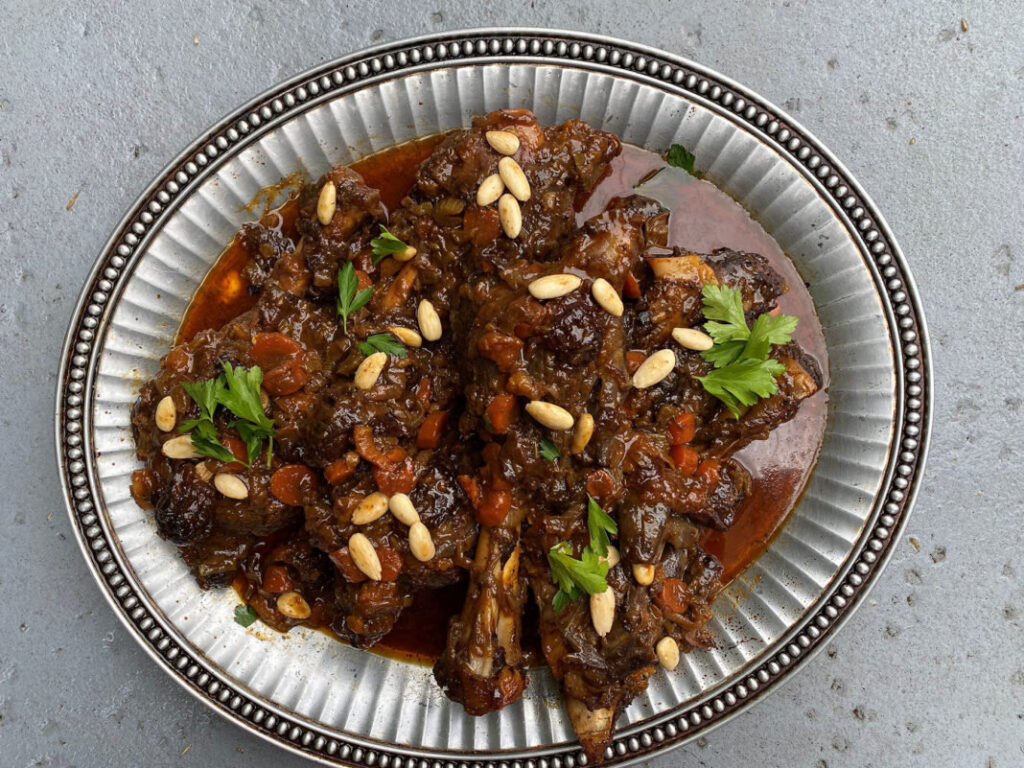
Passover is often referred to as Hag HaMatzot (the feast of unleavened bread) and matzo, the bread of affliction, is definitely the star of this holiday. The prohibition against eating chametz has us cleaning our homes and ridding our kitchens of anything and everything that contains grain, from alcohol to vinegar, from cereal to cakes, crackers and cookies.
But the name of the holiday is Hag HaPesach (the feast of the Paschal Lamb). On the night that the ancient Hebrews fled Egypt, they were commanded to sacrifice a lamb, to roast and to eat it as a family. They were commanded to smear the blood of the lamb on their door posts, so that the Angel of Death would pass over the homes of the Israelites. Called Zeroah in Hebrew, some commentaries say that the lamb shank represents the outstretched arm of G-d that led the Israelites out of slavery in Egypt and through the desert to the Promised Land. The lamb shank is a striking symbol and stark reminder of the drama of the Exodus from Egypt.
Rachel’s family hails from Larache, an important harbor town in northwestern Morocco. Her Spanish Moroccan grandfather Moshe Bensabat was the only Rabbi in the town. He performed all the wedding ceremonies and he was the mohel at all the Brit Milahs. When things got too hectic, they would bring in a Rabbi from the nearby cities of Tetouan and Tangir. Then Rachel’s Uncle Salomon (her mother’s brother) became a Rabbi and they both served the community until they made Aliyah to Israel in the early 1950’s. In Israel, Rabbi Salomon served as the secretary to the second Sephardic Chief Rabbi of the State of Israel, the revered Rav Yitzchak Nissim (son of former Knesset Member Moshe Nissim). In a reprise of his father’s role in Larache, Rabbi Salomon served as the sole clergy for the community of Barcelona. After 30 years there as a beloved Rabbi, he retired to Israel in the 1980’s where he later passed away.
Every Pesach, Rachel’s grandfather would shecht (slaughter) lamb and the lamb shanks would be on the Seder Plate to represent the Paschal Lamb sacrifice. Every Pesach, Rachel still follows the recipe passed down by her grandmother Simcha to her mother Rica and she makes the most delicious Marinated Glazed Lamb Shanks with dried fruit. The sautéed onions, celery and carrots add depth, the dried apricots add a tangy brightness and the prunes add a deep honey caramel which contrast with the robust flavor of the lamb. The lamb shanks are extra fabulous served over mashed or roasted potatoes.
We wish you a beautiful, meaningful happy and kosher Passover.
And we hope you try these extra special, delightfully rich and tasty lamb shanks.
Lamb Shanks with Dried Fruits
Symbolic of the Paschal sacrifice, lamb features on many Seder menus.
Marinating the lamb shanks with garlic and spices and cooking with dried fruits in a long slow simmer ensures a mouthwatering dish.
Ingredients:
4-6 lamb shanks
1 large onion, sliced thinly
2 tablespoons olive oil
2 large carrots, sliced into thick rounds
2 stalks celery, sliced thinly
1 cup pitted prunes
1/4 cup dried apricots, chopped
Marinade:
1/2 cup olive oil
1 tablespoon cumin
1 tablespoon paprika
2 teaspoons salt
1 tablespoon herb de Provence
6 garlic cloves, grated
1/2 cup red wine
In a large bowl combine all the marinade ingredients and rub on lamb shanks. Let marinate for one hour in a heavy pot or Dutch oven, warm olive oil and sauté the sliced onion until they start to soften. Add the vegetables and dried fruits, place lamb and all the marinade juices in the pot Add 2 cups of water, cover and place in oven for two hours at 350 degrees.
The lamb should be falling off the bone. If not, leave it for another 15-30 minutes in the oven.
Serves 8-10
Rachel Sheff and Sharon Gomperts have been friends since high school. They love cooking and sharing recipes. They have collaborated on Sephardic Educational Center projects and community cooking classes. Follow them on Instagram @sephardicspicegirls and on Facebook at Sephardic Spice SEC Food.

